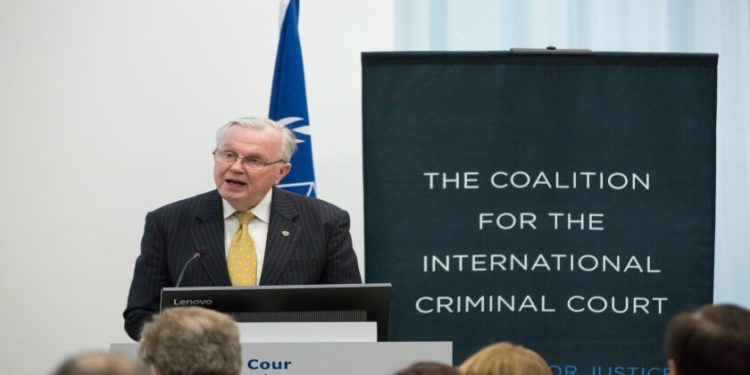Dr Hans Corell is a Swedish lawyer and diplomat who served as the Under-Secretary-General for Legal Affairs and the Legal Counsel of the United Nations between March 1994 and March 2004. The following is a speech he gave at a forum organised by the Coalition for the International Criminal Court (CICC) in The Hague to Commemoration of the 20th Anniversary of the Rome Statute:
Excellences, Ladies and Gentlemen, Colleagues and Friends, Let me first thank Bill Pace and the Coalition for the International Criminal Court (CICC) for the invitation to participate in this Commemoration and to contribute these brief reflections.
My memories from the 1998 Rome Conference are very positive indeed. As the Representative of Secretary-General Kofi Annan, I was responsible for the organisation of the Conference, together with my team from the Codification Division of the United Nations Office of Legal Affairs, led by its Director Roy S. Lee, who was the Executive Secretary of the Conference, and Manush Arsanjani, who performed the important function of Secretary of the Committee of the Whole.
Let me first mention that we had an excellent cooperation with the host country, Italy, and with the city of Rome. This was of tremendous importance, since the five-week Conference was intense and in need of all possible technical support. Let me also thank the CICC, which made a great contribution to the successful outcome in Rome. The manner in which the Coalition coordinated the work of the non-governmental organisations could actually serve as a model for the way in which civil society should act in order to effectively influence and support the work of intergovernmental organisations.
However, at the end of the day the success of the Rome Conference was the result of the commitment and determination with which the participating states and those who represented them acted in Rome. It was great to see the manner in which they engaged in their work and their search for solutions of the many questions on the table during the negotiations.
This determination was also translated into the ratification process. The 60 ratifications required for the entry into force of the Statute were received by my office in record time with the result that the Rome Statute entered into force on 1 July 2002. The ceremony for the swearing in of the judges in The Hague on 11 March 2003 was a great moment in the history of international criminal law. Today, there are 123 parties to the Rome Statute.
Others may testify to the work in establishing the organs of the International Criminal Court and the first cases brought before the Court. What I would like to focus on now is the future.
My first observation here is that a properly functioning international criminal justice system is an absolute necessity in a globalising world. As I have said in the past, imagine the situation at the national level if the criminal justice system suddenly did not function in a district or a region in a country. Would it then be possible to govern this country? Of course not! The same actually applies at the international level. And this will be increasingly apparent in the near future.
Against this background it is of crucial importance that the organs of the Court and the Assembly of States Parties perform their functions with this in mind. In addition, the support of the States parties is a precondition for a successful conduct of the work of the Court. I refer to my reflections in the past on the challenges for the ICC.
My second observation in this context relates to the responsibility of the United Nations Security Council. It is absolutely necessary that the Council fulfils its functions under the UN Charter and the Rome Statute. I refer in particular to the important provision in article 13 (b) of the Statute, according to which the Security Council acting under Chapter VII of the UN Charter can refer situations to the ICC Prosecutor. What signal does it send if the Council ignores this provision when the whole world sees that the Council should act and apply the article?
Furthermore, if the Council has referred a situation to the ICC Prosecutor, what impression does it make if the Council does not act in consequence with such a reference? If the evidence leads the Prosecutor to persons at the highest national level, the Council must follow suit and order the state to transfer the persons in question to the ICC. This would simply be acting in consequence with the manner in which the Council operated when it established the international criminal tribunals in the 1990s.
The performance of the UN Security Council for a successful result of the work of the ICC simply cannot be overemphasised. Ultimately, this is about the responsibility of states to respect the universal and indivisible core values and principles of the United Nations – human rights, the rule of law and democracy – as so clearly stated in the Declaration of the Highlevel Meeting of the General Assembly on the Rule of Law at the National and International Levels of 24 September 2012.
A primary duty of the members of the most powerful organ of the United Nations must be to bow to their obligations in this respect. If they do, they will also be in a better position to prevent conflicts and violations of international criminal law.
Thank you!







